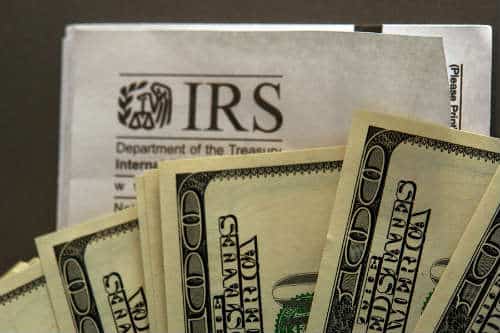Starting in spring of 2017, the IRS plans to allow private debt collection agencies to retrieve outstanding tax debt from consumers on behalf of the government. Signed into federal law under the Fixing America’s Surface Transportation Act (FAST Act) in December 2015, the aim is to help retrieve a whopping $380 billion that the IRS doesn’t have the resources or manpower to collect.
What does this mean for consumers? We’ll a look at a number of changes and consumer concerns for this relatively new partnership, including what has changed, who the authorized debt collection agencies are, consumers’ rights under the new law, and perhaps most importantly, how to avoid becoming a victim to scammers.
So, What’s Changed?
If you’re thinking that mixing federal and private debt together is dubious, you should know that this isn’t the first time the IRS has used private companies to collect outstanding taxes. Starting in 2004 under the American Jobs Creation Act, the IRS was granted the authority to contract out certain outstanding tax debts that the IRS didn’t have the ability to deal with.
This initiative was only partially successful, with private debt collectors only able to retrieve less than .001% ($98 million) in outstanding IRS funds during a five-year period. In 2009, this private debt collection of IRS ended, cited by Congress as losing money and deemed ineffective. It was discovered that while debt collectors could pursue the debt, they ultimately lacked the power and options that the IRS traditionally uses to collect debt, including offers in compromise, tax liens, and so forth.
Now, the same idea has been brought back, but with more accountability.
- There will be a process for vetting debt collectors, with their conduct closely monitored by the IRS.
- The IRS is in charge of determining an appropriate fee structure and requirements for how debt is collected via private debt collectors.
- The IRS is now required to report its progress on these changes in performance evaluations, both internal and independent.
For consumers who owe back taxes, this may mean that you start receiving those nagging calls and bills that you thought were a thing of the past.
Authorized Agencies
Not just any debt collection company has been selected by the IRS. Out of more than 4,100 private debt collection companies in the US, only four have been chosen:
- Conserve [http://conserve-arm.com/]
- Pioneer [https://www.pioneercreditrecovery.com/]
- Performant [https://www.performantrac.com/ ]
- CBE Group [http://www.cbegroup.com/]
Consumers Rights Under the New Legislation
For those four companies, consumers are still granted all of the protections contained in the Fair Debt Collection Practices Act (FDCPA). Collection agencies still cannot:
- call you before 8am or after 9pm, which can be reversed by request if you are an overnight shift worker.
- contact you at work if you’ve stated verbally or in writing that your employer doesn’t allow private calls in the workplace
- contact a third party about you for any reason other than getting your contact information (in other words, they can’t tell anyone that you owe money.)
- harass, intimidate or abuse you or anyone else they contact about you
- misinform you about the amount you owe
- use deceptive methods to collect a debt from you, including:
- claim to be law enforcement
- claim that you’ll be arrested for non-payment
- threaten your property or your wages (garnishment, seizure, etc.) unless permitted by law to do it and intend to do so
- provide false credit information about you to anyone
- use a fake company name
What’s new to this legislation is:
- Private collection agencies cannot ask for payment on a prepaid debit card, gift card, or cash.
- Those with outstanding debt will be informed about electronic payment options for taxpayers on IRS.gov.
- Payments should be payable to the U.S. Treasury and sent directly to IRS, not the private collection agency.
- If you are included in this program, you will first receive a letter from the IRS, informing you that you’ve been selected for debt collection by one of the four aforementioned companies. Following this, a second letter will arrive from the collection agency, informing you that you be contacted in the near future regarding overdue back taxes.
If you’re leery of working with a private collection agency to settle your overdue tax account, you must submit a request in writing to the private collection agency. Considering that the IRS has more versatile options for collecting tax debt, such as an offer in compromise, it may be better for consumers to avoid private debt collection in favor of the IRS.
How to Not Get Scammed
The four private debt-collection companies listed before can be one way to determine if the company you are dealing with is legitimate. Not a listed company? Not a valid IRS debt collection company, and it should arouse your suspicions.
Even though the federal government is still involved, you should be on your guard and use your discretion when dealing with these outsourced companies. One popular method used by scammers is calling consumers directly, claiming to be from the IRS. With this new outsourcing of the IRS to private companies, expect scammers to shift their focus towards impersonating these four companies. According to the IRS,
“Even with private debt collection, you shouldn’t receive unexpected phone calls from the IRS demanding payment. When people owe tax, the IRS always sends several collection notices through the mail before making phone calls.”
Common sense is your best weapon to avoid being scammed. It’s always helpful to be familiar with debt collectors tactics, and how their ethics—even working as an official surrogate for the IRS—may be skewed.
If you feel that you are receiving being scammed or mistreated by a debt collector, the IRS urges consumers to call the TIGTA hotline at (800) 366-4484, visit www.tigta.gov, or write to:
Treasury Inspector General for Tax Administration Hotline
Post Office Box 589
Ben Franklin Station
Washington, DC 20044-0589










